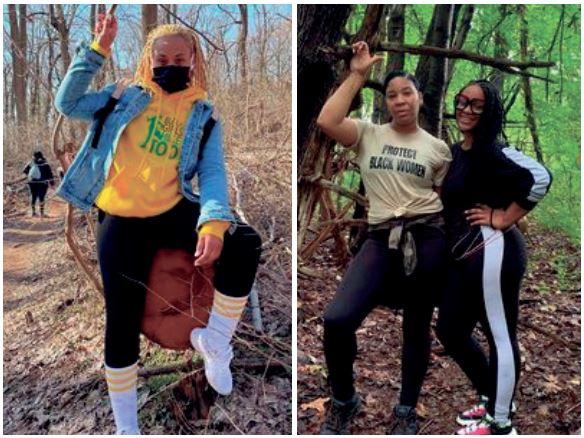Wilmington, Del. (AP) – Hiking, for many people, is “not something that you picture Black girls doing.” But Stephanie Sanford wanted to change that narrative.
Black Americans are consistently underrepresented in outdoor activities. According to one survey in ABC News, only 6% of national park visitors were Black in 2018. From safety concerns around hiking alone to a lack of family or community hiking teachers, there are a host of reasons why hiking is often less accessible to Black Americans.
To counter these obstacles, Sanford started Black Girls Hike Too, a Delaware-based community of Black women hikers. These guided hikes are open to Black women of all ages, backgrounds, and experience levels, and integrate small group meditation and breathing exercises into scenic outdoor experiences.
FROM THE CIRCLE
Sanford starts each hike with a sharing circle, where she encourages everyone to set an intention and share one word for how they’re feeling. This intention-setting often led to ongoing conversations throughout the hike about the individual and collective weights each woman wanted to, as Sanford encourages, “leave in the woods.”
For Atiya Chase, who hiked with Black Girls Hike Too in the fall, her intention was “leaving anxiety behind.” Chase said that she often felt herself “holding her breath,” struggling with panic attacks and the toll of the Black lives lost to the fight against racism over the past year.
“Being able to have that opportunity with other women to breathe – I mean it was an amazing inhale and exhale,” she said. “We laughed together, we cried together. It made you feel like you weren’t alone.”
Through the conversations Sanford leads on stress and mental health for Black women, she particularly encourages her hikers to open up and ask for help. She believes a hesitance to ask for help is one of the biggest barriers to mental health support for Black women, she said, and hopes that leading vulnerable conversations among Black women about their emotional needs can help change that culture.
BATTLING DISORDER
In the spirit of that vulnerability, Sanford shared that she’d recently been diagnosed with attention deficit hyperactivity disorder – more commonly known as ADHD – and said she wished she’d had a more diverse picture of what ADHD looked like while she was still in school.
If she’d had the advantage of an earlier diagnosis, Sanford wondered if her difficulty focusing wouldn’t have prevented her from finishing college. Sanford is grateful, though, that she knows herself better now, and hopes to pass on to other women what she’s learned about mental health, opening up, and self care.
Black women already face serious physical and mental health disparities when compared to their white counterparts. When they feel unsafe or unwelcome in the outdoors, they can lose one of the few safe avenues for healthy stress relief and exercise during a pandemic that’s already demanded so much of them.
Lynnae McIntosh, a lifelong Girl Scout and experienced hiker, talked about some of those unique challenges and the way Black Girls Hike Too encouraged her to share them with others who could understand.
“We are protector, provider, nurturer, all in one,” McIntosh said, noting that Black women have to wear “many hats.”
PANDEMIC CHALLENGE During the pandemic in particular, she’s had to take on even more roles. “You’re not only mom now, you’re teacher,” she said, “on top of working and then providing for your household.” It was all the more valuable, then, for her to have a space where she could talk openly about Latoya Furrowh, who hiked for the first time with Black Girls Hike Too, shared a similar feeling of “carrying the weight of the world” – a combination of anger over recent events like the death of George Floyd and the “many injustices that were being televised,” as well as the numerous pressures in her own personal life.
She came into her first hike a little nervous, wondering whether she had the right equipment or what might happen if she got hurt. But Sanford and her group made her feel “extremely comfortable,” and Furrowh continued to come back after what she described as a “mind-blowing experience.”
To anyone on the fence about joining Sanford and Black Girls Hike Too, she encouraged them to “just do it.” Or, as Chase put it, “Do not allow your preconceived reservations about hiking to deter you from coming to a space where you can receive your true healing.”













No Comment